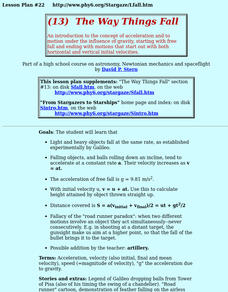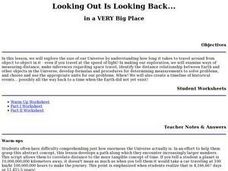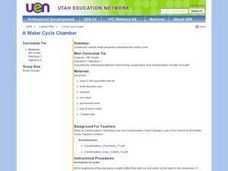Curated OER
The Math Reaction
Students use the reaction time to figure out problems. They use the following example to get them started with reaction time: the edge of a ruler is placed near a person's thumb and index finger and, without warning, the ruler is...
Curated OER
Playground Games
Students compete in playground games in order to review velocity and wave behavior in real life situations. They demonstrate understanding by calculating velocity in their "Playground Games" packet.
Santa Monica College
Flame Tests of Metal Cations
Scientists used flame tests to identify elements long before the invention of emission spectroscopy. Young chemists observe a flame test of five metal cations in the fourth lesson of an 11-part series. Individuals then work...
Curated OER
The Big Bang-Hubble's Law
In this Hubble's law activity, students use data for galaxies which include their distance and speed. Students make a graph to show the distance to each galaxy and the speed of each galaxy. They use their graph to answer 4 questions...
Curated OER
Equations with one Variable II
In this single variable equations worksheet, learners solve 5 problems using different equations to solve for one unknown. They use Hubble's Law to find the velocity of a galaxy knowing the distance it travels.
Curated OER
Details from an Exploding Star
In this nebula worksheet, students read about the Crab Nebula and calculate the average speed of the expanding gas. They determine the size of the smallest clumps of gas and they draw the diameter of the solar system to scale.
Curated OER
Aurora to Magnetosphere Global Exploration
In this magnetosphere global exploration worksheet, students read about the instrument on board a satellite launched by NASA called the Radio Plasma Imager. This imager detects echoes from plasma clouds. Students calculate the distance...
Curated OER
Falling into a Black Hole
In this black hole worksheet, students solve 3 problems given the equation used to determine the speed of a falling body using its mass, the constant of gravitation and the distance it will travel.
Curated OER
Applied Science - Technology (5A) Lab
Fifth graders explore electromagnetic waves and light. In this light lesson, 5th graders draw the parts of a wave of the electromagnetic spectrum. They compare a flashlight to a laser to see how the light looks when shined through...
Curated OER
Refraction Through a Triangle
In this refraction through a triangle worksheet, students use a given diagram of light striking a triangular piece of plexiglass to determine the light ray's angle of incidence, the ray's angle of refraction, they use Snell's Law to...
Curated OER
Black Holes...Hot Stuff!...VIII
In this black holes worksheet, students solve three problems about black holes using given equations for determining the temperature of the gases in a black hole and the visible light from the black hole at given temperatures.
Curated OER
Variables and Expressions from Around the Cosmos
In this variables and expressions worksheet, students solve 7 problems using different mathematical formulae to find the length of Earth's day in the future, the distance to the galaxy Andromeda, the temperature of a gas cloud emitting...
Curated OER
The Physics of the Planets: How 16th and 17th Century Physicist Helped Us Understand Our Solar System
Eighth graders draw the paths of the planets in the solar system. In this astronomy lesson, 8th graders calculate speed of objects using distance and time information. They research about the work of scientists in the 16th and 17th century.
Curated OER
Shadowing a Musher For Nine Days
Seventh graders follow and record the progress of a musher on the Iditarod race. They access the official Iditarod website, determine the musher's overall speed, the daily average temperature and daily hours of sunlight, and develop a...
Curated OER
Newton's 2nd Law
Fourth graders discuss Newton's Second Law of Motion, and the acceleration of fast and slow moving objects. They experiment with items with different masses to determine the effect mass has on acceleration using a toy car. They complete...
Curated OER
Applications of Parabolas
In this algebra worksheet, 11th graders rewrite word problems using algebraic symbols. They relate parabolas to the real world and calculate the breaking distance using the distance formula they come up with. There is answer key.
Curated OER
Seasonal CEENBoT
Students simulate the Earth's revolution around the sun using CEENBoT. In this earth science lesson students calculate the Earth's distance in AU and it's speed of revolution. They explain how the Earth's movement cause seasonal variation.
Curated OER
Electromagnetic Radiation and the Bohr Atom
In this light worksheet, students calculate the frequency and wavelength. Students practice applying Planck's constant and determining the energy of a photon. This worksheet has 9 problems to solve.
Curated OER
Where's My Bot?
Students estimate geographic position based on speed and air travel. In GPS lesson plan students use GPS to estimate the set and drift of currents.
Curated OER
The Way Things Fall
Students see that light and heavy objects fall at the same rate, as established experimentally by Galileo. They see that falling objects, and balls rolling down an incline, tend to accelerate at a constant rate a. Their velocity...
Curated OER
Looking Out Is Looking Back...
Students explore the size of our Universe by understanding how long it takes to travel around from object to object in it - even if you travel at the speed of light! In making our exploration, we will examine ways of measuring distance,...
Curated OER
The 35mm Camera Lesson
Ninth graders explore the 35mm camera. They discuss and identify the various parts and characteristics of the 35 mm camera. Students examine the two aspects of a 35 mm camera that control the light.
Curated OER
Astronomical Scales
Students describe the different units of measurement. In this space science activity, students calculate astronomical distances using a scale. They explain the significance of using scientific notation in expressing very small or...
Curated OER
A Water Cycle Chamber
Fourth graders are shown the water cycle by watching a demonstration by their teacher. In groups, they are given one two-liter bottle with a starter hole and follow instructions to complete the set up. They place ice cubes into the...

























